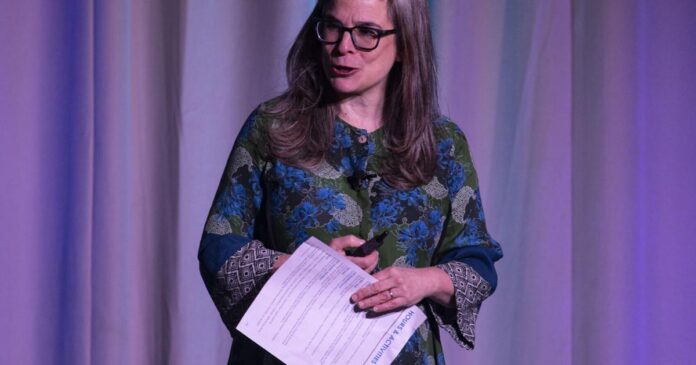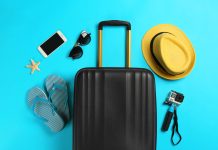TRAVERSE CITY — If there was a silver lining to the COVID-19 pandemic, it was that travelers went outdoors more than ever, said tourism expert Pauline Frommer at the 2022 Pure Michigan Governor’s Conference on Tourism at Grand Traverse Resort and Spa.
“Somehow during the pandemic everybody discovered nature,” said Frommer, co-president of New York-based Frommer Media, known since 1957 for its travel guide books, podcast and website that garners 3 million unique users a month.
“A lot of people who were urban types, suddenly wanted to get away from other people and discovered nature vacations.”
Michigan with its natural beauty was “an incredible destination,” she said, referring to popular destinations such as Sleeping Bear Dunes National Lakeshore, as well as the resources of the Great Lakes.
“It was inundated over the last year, and I’m sure there have been some stressors.”
Speaking about “The Trends That Are Shaping Travel Today,” Frommer told the nearly 500 travel industry attendees on Wednesday that “stressors” made things challenging for destinations around the country.
She said:
- Arches National Park in Utah had to close its gates 120 times in 2021 because it could not handle the parking lots.
- Yellowstone National Park experienced 4.4 million visitors in 2021, 1 million more than in 2020.
- And the Grand Canyon had a record number of rescues, she said.
“The rangers spent all this time going out and getting people out of pickles because you had all of these urban folks in the wilderness,” Frommer said.
From her personal research as a journalist and from her contributors, she said several trends surfaced from the increase in nature travel.
Gone are seasons such as “summer” or “leaf-peeping.”
“Seasonality is over,” she said, adding that travelers are now visiting nature destinations during “mud season.”
Advance reservations are now the norm because it helps travel destinations plan for staffing, supplies and managing their site.
“It seems strange to get a reservation to go to a park,” she said. “A lot of travel is trying to train the consumer to book ahead.”
“Foodie travel” used to be king, pre-pandemic, she said. But now it’s a little more challenging for the consumer with restaurants slimming their menus and closing Sundays, Mondays and Tuesdays because of staffing and supply chain issues.
On the positive side, local producers are gaining business, she said. On the negative side, robots are being used to flip burgers.
She also noted:
- The popularity of Vrbo and Airbnb, which is affecting hotels.
- How bars are creating more programming and events to attract customers, who are relying on dating apps rather than meeting at a bar or club.
- How travelers want destinations to be more aware of their role in protecting the climate.
- Making your community welcoming to marginalized communities is not only “ethically the right thing to do,” but also makes smart business sense.
- The growth of “micro tour ops,” which offer curated experiences like shopping excursions, walking tours and dining at a person’s house.
- How one national hotel ownership group is experimenting with sliding scales for things such as pool use, the fitness room and business center.
She hopes sliding fees don’t catch on.
“I think it’s a hideous fee,” Frommer said, “and anyone who works in the travel industry please try and put a stop to this. I think it will turn off travelers … and have a long-term impact.”
She opened with history about her father, Arthur, who started writing books and his love for travel while in the U.S. Army. As the son of immigrant parents, he learned to speak German and Russian, which led him to be stationed in Berlin during the Korean War.
His first national release was “Europe on $5 a Day,” which went on to become the best-selling guide book of all time, she said.
She also wove in stories about going to clubs for research and personal experiences about shopping with her teen daughter in Paris.
Attendees loved her presentation, which was more like a “conversation.”
“What I appreciated was the authentic and genuine way she spoke to us,” said Mary Beth Stutzman, president and CEO of Visit Alpena.
“It was like we were having more of a one-on-one conversation rather than sitting in a room taking notes from a screen. It was more personal, which hit home.”
It also hits home for those who want to provide travelers with tools to have a positive experience, especially if they are new to a destination or stuck in a rut.
For example, more than 80 percent of Mackinac Island is a State Park, yet many don’t venture too far from the fudge shops, said Michelle Walk, membership and development coordinator at Mackinac State Historic Parks.
“We have a lot of opportunities for people to explore if they feel comfortable leaving Main Street,” Walk said. “They have plenty of time on their way to and from the ferry to do that, but we want them to explore the rest of the island, too. It’s unique.”
Frommer closed her presentation with a mini version of why she loves northern Michigan, a talk she often delivers to consumer groups around the country. As a former student at Interlochen Arts Academy, she has visited the area many times.
She touted skiing, Mackinac Island, fly fishing, the wineries of northern Michigan and the kayaking trails.
“I say go to northern Michigan … You’re never more than six miles from a body of water, and they make water really, really fun,” Frommer said.
Learn more about Frommers at Frommers.com.
Learn more about the conference at puremichigan.com.










